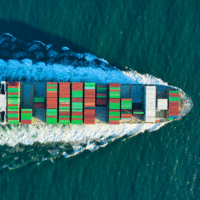By Angela M. Rossi, Esq.
Since the start of the COVID pandemic, many Americans have experienced something never before seen in their lifetimes — empty shelves.
What many Americans do not know is that there is a 90% chance that their online orders and the products on the store shelves come from a seafarer on a cargo/container ship. The container ships off-load in ports around the world, including the Port of Los Angeles and Long Beach. There is an average of 70 container ships anchored daily outside the waters of the Port, waiting to off-load, causing a shortage of materials and products to meet consumer demands.
However, the pandemic is not the sole cause of the supply chain issues. The problems start as soon as ships reach the port. There are too few berths, too few workers to operate the cranes to off-load the containers, warehouses filled to capacity, and not nearly enough truck drivers and chassis to handle the containers that quickly pile up. To off-load a container ship calling in the Los Angeles-Long Beach port takes three to five days. The vessels are unloaded by the union longshore workers and loaded onto trucks and trains to move cargo to warehouses inland. If the trucks and trains don’t show up, goods start piling up on the docks, preventing longshore workers from unloading more ships. Unionized dock workers maintain that they cannot unload ships any faster because a shortage of truck and railroad workers is leaving tons of cargo stranded on docks, throwing off their fragile ecosystem. Arriving vessels then start to line up outside the port, and the entire system grinds to a halt. As of October 2021, the containers off-loaded from cargo ships sat at the port of Los Angeles and Long Beach for an average of 5.94 days before being picked up by a truck – a 38% increase from the start of the pandemic.
Who is Responsible for the Delays and Limited Supplies?
The supply chain issues are complex and pose many challenges. So who is to blame? The shipping lines, which are seeing record profits; the terminals, with too few workers to off-load the containers; or the motor carriers and truckers?
One of the largest and most difficult factors to predict and manage is labor. Officials from the Teamsters and others place the blame for many of the problems on the fact that companies are classifying the drivers as independent contractors. The problem is not too few drivers, but rather a system in which drivers must bear much of the financial burden themselves, including paying for trucks and fuel — while having none of the regular employee benefits, such as sick pay or health insurance. Overworked employees, while paid grandly for overtime, raise the concerns of onsite work accidents for personnel exhausted from long shifts. It takes a toll on the humans who off-load the containers and load them onto the 18-wheelers that drive the containers to the overfilled warehouses for workers to unload and sort.
What is the Solution?
California and the City of Los Angeles have taken action to address the concerns of truck drivers and other independent contractors who work at the Port:
In 2017, the Los Angeles City Council voted to explore blocking companies that use truck drivers classified as independent contractors from doing business at the Port of Los Angeles.
On January 1, 2020, California Assembly Bill 5 (AB5) – also known as the “gig worker bill” – went into effect. This legislation requires companies that hire independent contractors to reclassify them as employees. AB5 is based on Dynamex Operations West v Superior Court, a 2018 California Supreme Court case that established a presumption that workers are employees unless the hiring company can prove otherwise. AB5 requires companies to use a three-prong test, commonly known as the “ABC” test, to determine if workers are independent contractors and not employees.
The implementation of AB5 has heavily impacted the trucking and other industries. More than 1,000 motor carriers, as well as port truck drivers, have filed claims in civil court or with the California Department of Industrial Relations to contest or enforce the application of the ABC test. In People v. Superior Court (Cal Cartage Transportation Express, LLC (2020) 57 Cal. App. 5th 619, federally licensed motor carriers that operated around the Ports of Los Angeles and Long Beach claimed that the ABC test prohibits them from using independent contractors. They sought to enjoin the enforcement of AB5, arguing that the Federal Aviation Administration Authorization Act of 1994 (FAAA), preempted AB5. The Court disagreed and found no preemption.
In California Trucking Ass’n v. Bonta, (9th Cir. 2021) 996 F. 3d 644, the motor carriers argued that increased labor costs caused by AB-5 would likely put small motor carriers out of business and force other motor carriers to leave California. The Court rejected that argument and also held that the application of AB-5 to motor carriers is not preempted by the more favorable FAAA.
More recently, State Senate Bill 338, which took effect on January 1, 2021, penalizes cargo owners who use companies with drivers who are not employees.
Whether these measures will help ease the current supply chain shortage remains to be seen. The issues are complicated and are not limited to the local ports in California but to supply chain bottlenecks around the world. Until these supply chain disruptions are resolved or reduced, it may be a good idea to stock up on your favorite products when you are lucky enough to find them on the shelf!

Angela M. Rossi, Esq. is an experienced attorney who has over three decades of solid expertise practicing law. She is an accomplished litigator both in and out of the courtroom, with experience that includes countless trials and binding arbitrations. Her law practice includes products liability, premises liability, security guard law, construction defect, trucking company defense, and personal injury. In her construction defect practice, Ms. Rossi is highly skilled in defending organizations of all sizes, from small subcontractors to general contractors and large developers. She has also been a volunteer arbitrator through the Los Angeles Superior Court.
Ms. Rossi earned her Juris Doctorate from the Pepperdine University School of Law and was admitted to practice in the courts in the State of California (all courts), the United States District Court for the Central District, and the United States Supreme Court.

One of the sources for this article is a paper that was written by Ms. Rossi’s daughter, Amanda Yeam, who is a 1C at the United States Merchant Marine Academy (USMMA), one of the five Federal Service Academies. As part of Amanda’s Sea Year training, she worked on a cargo ship that brought containers to the port of Los Angeles / Long Beach. Amanda is studying to become a deck officer and upon graduation will be licensed to pilot ships of all tonnages on all oceans. Upon graduation in June 2022, she will receive a Bachelor of Science in Marine Transportation /Logistics and Security and will have the United States Coast Guard Mariner License.

